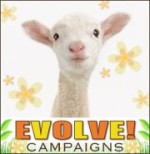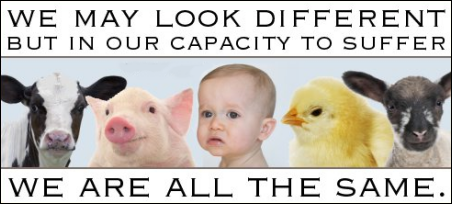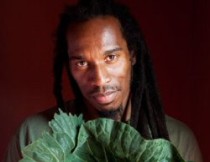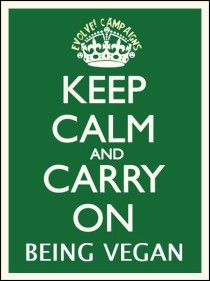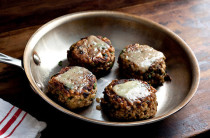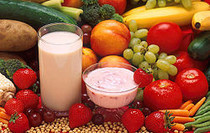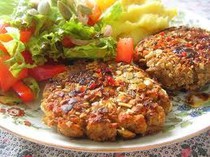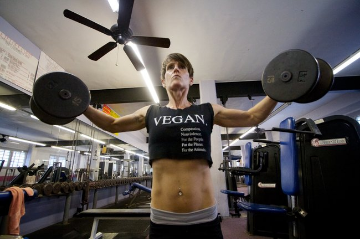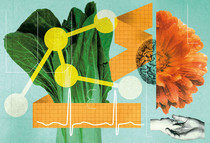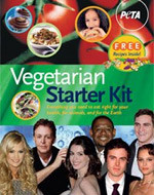EVOLVE! - go meat-free
EVOLVE!
Veganism is a way of life which recognises the right of all sentient animals to be treated with respect and justice. It's about doing the best we can to align our actions
with these values. This means not consuming, wearing or using animals, nor taking part in activities of their exploitation. Being vegan is the most responsible and morally conscious thing each one of
us can do. To learn about how veganism helps not only animals, but also our own health and spirituality; as well as how it can ease world hunger and why it really is the only hope for the future of
our beautiful planet. more
.
Benjamin Zephaniah
Evolve Campaigns
"Benjamin developed a love of animals at an early age, becoming vegetarian at the age of 11 and vegan at 13. "I didn’t even know what the word meant," he says. "I just
knew that I didn’t want to eat animals - it was a real gut feeling. At the time I was in a school where I was getting so much racism, I found comfort in animals. A playground can be the loneliest
place in the world when all the kids are playing and nobody will talk to you, so when a cat comes along, you play with the cat, you know? And then the cat comes again the next day and brings a couple
of his friends, and you form a community. So that’s where my love of animals started, and that was when I went vegetarian. And later on I decided that I just didn’t want anything to do with any
animal product."" Read more
Benjamin Zephaniah, Wikipedia
A Vegetarian Burger Bash
The New York Times
By TARA PARKER-POPE
March 30, 2012
For burger lovers who want to cut back on meat, vegetarian burgers can be a tasty and healthful way to recreate the burger experience. In this week’s Recipes for Health,
Martha Rose Shulman offers five ways to create vegetarian burgers at home. Read more
Vegetarianism
Wikipedia
Vegetarianism is the practice of abstaining from the consumption of meat (red meat, poultry, seafood and the flesh of any other animal), and may also include abstention from by-products of animal slaughter.[2][3][4][5]
Vegetarianism can be adopted for different reasons. Many object to eating meat out of respect for sentient life. Such ethical motivations have been codified under various religious beliefs, along with animal rights. Other motivations for vegetarianism are health-related, political, environmental, cultural, aesthetic or economic. There are varieties of the diet as well: an ovo-vegetarian diet includes eggs but not dairy products, a lacto-vegetarian diet includes dairy products but not eggs, and an ovo-lacto vegetarian diet includes both eggs and dairy products. A vegan diet excludes all animal products, including eggs, dairy, beeswax and honey. Some vegans also avoid animal products such as leather (and possibly silk) for clothing and goose-fat for shoe polish.
Various packaged or processed foods, including cake, cookies, candies, chocolate, yogurt and marshmallows, often contain unfamiliar animal ingredients, and may be a special concern for vegetarians due to the likelihood of such additions.[4][6] Often, products are reviewed by vegetarians for animal-derived ingredients prior to purchase or consumption.[6] Vegetarians vary in their feelings regarding these ingredients, however. For example, while some vegetarians may be unaware of animal-derived rennet's role in the usual production of cheese and may therefore unknowingly consume the product,[4][7][8] other vegetarians may not take issue with its consumption.[4][5]
Semi-vegetarian diets consist largely of vegetarian foods, but may include fish or poultry, or sometimes other meats, on an infrequent basis. Those with diets containing fish or poultry may define meat only as mammalian flesh and may identify with vegetarianism.[9][10] A pescetarian diet has been described as "fish but no other meat".[11] The common use association between such diets and vegetarianism has led vegetarian groups such as the Vegetarian Society to state that diets containing these ingredients are not vegetarian, due to fish and birds being animals.[12] Read more
Is Veganism Good for Everyone? NYT Debate
Veganism
Wikipedia
Veganism is both the practice of abstaining from the use of animal products, particularly in diet, and an associated philosophy that rejects the commodity status of animals.[9] A follower of veganism is known as a vegan.
Distinctions are sometimes made between several categories of veganism. Dietary vegans (or strict vegetarians) refrain from consuming animal products, not only meat but also eggs, dairy products and other animal-derived substances; this is known as a vegan or entirely plant-based diet.[10] The term ethical vegan is often applied to those who not only follow a vegan diet but extend the philosophy into other areas of their lives, and oppose the use of animals for any purpose.[n 1] Another term is environmental veganism, which refers to the avoidance of animal products on the premise that the harvesting or industrial farming of animals is environmentally damaging and unsustainable.[12]
The term vegan was coined in 1944 by Donald Watson when he co-founded the Vegan Society in England, at first to mean "non-dairy vegetarian" and later "the doctrine that man should live without exploiting animals."[13] Interest in veganism increased in the 2010s; vegan options became increasingly available in many countries, including in supermarkets and chain restaurants.[14]
Vegan diets tend to be higher in dietary fibre, magnesium, folic acid, vitamin C, vitamin E, iron and phytochemicals, and lower in calories, saturated fat, cholesterol, long-chain omega-3 fatty acids, vitamin D, calcium, zinc and vitamin B12.[n 2] Well-planned vegan diets can reduce the risk of some types of chronic disease, including heart disease,[16] and are regarded as appropriate for all stages of the life-cycle by the American Academy of Nutrition and Dietetics, the Australian National Health and Medical Research Council, and Dietitians of Canada.[17] Because uncontaminated plant foods do not provide vitamin B12 (which is produced by microorganisms such as bacteria), researchers agree that vegans should eat B12-fortified foods or take a supplement.[n 3]
.
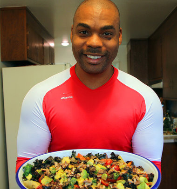 Kenneth G. Williams, a 44-year-old bodybuilder in Oakland, Calif., is a vegan who has taken on traditional bodybuilders and won. Credit Jim Wilson/The New York Times
Kenneth G. Williams, a 44-year-old bodybuilder in Oakland, Calif., is a vegan who has taken on traditional bodybuilders and won. Credit Jim Wilson/The New York Times
Sculptured by Weights and a Strict Vegan Diet
The New York Times
By MARY PILON
JAN. 4, 2012
HUNTSVILLE, Ala. — Jimi Sitko gets up at 4 most mornings, works out two to four hours a day and can bench-press nearly twice his weight. He has a shaved head and a brightly colored tattoo on his left arm, and he can easily be mistaken for a Marine separated from his platoon.
His apartment is filled with medals and trophies from bodybuilding competitions, snapshots of his tanned, rippled physique in full flex. His uniform is an assortment of sweat pants and hoodies, which he occasionally lifts when his abs look particularly fierce.
But most surprising is what is inside Sitko’s stomach: tofu, fresh greens and plant-based protein powder.
Sitko is among a niche community of vegan bodybuilders.
As the popularity of veganism has spread in recent years — fueled in part by a flurry of food-focused documentaries like "Super Size Me," "Food, Inc." and "Forks Over Knives" — its imprint can be seen in industries like publishing (VegNews) and fashion (hemp tote bags).
It has even entered bodybuilding, perceived by many as a population of vein-popping men and women thriving off meat and artificial enhancements. Competitors like Sitko are forging a distinctive subculture of antibeef beefcakes who hope to change more of their competitors’ eating habits. Read more
The Challenge of Going Vegan
The New York Times
By TARA PARKER-POPE
April 16, 2012
From Bill Clinton to Ellen DeGeneres, celebrities are singing the benefits of a vegan diet. Books that advocate plant-based eating are best sellers. But is
eliminating meat and dairy as simple as it sounds?
As countless aspiring vegans are discovering, the switch from omnivore to herbivore is fraught with physical, social and economic challenges — at least, for those who
don’t have a personal chef. The struggle to give up favorite foods like cheese and butter can be made all the harder by harsh words and eye-rolling from unsympathetic friends and family members.
Substitutes like almond milk and rice milk can shock the taste buds, and vegan specialty and convenience foods can cost two to three times what their meat and dairy equivalents do. And new vegans
quickly discover that many foods in grocery stores and on restaurant menus have hidden animal ingredients.
"The dominant social-cultural norm in the West is meat consumption," said Hanna Schösler, a researcher in the Institute for Environmental Studies at Vrije University
in Amsterdam, who has studied consumer acceptance of meat substitutes. "The people who want to shift to a more vegetarian diet find they face physical constraints and mental
constraints. It’s not very accepted in our society not to eat meat."
Still, the numbers are substantial, according to according to a 2008 report in Vegetarian Times. Three percent of American adults, 7.3 million people, follow a vegetarian diet, and one million of them are vegans, who eat no animal products at all — no meat, fish, eggs, milk, cheese, even honey. (And 23 million say they rarely eat meat.)
No one knows how many people have tried and failed to switch to vegan or vegetarian diets, but the popularity of books like "The China Study" and the "Skinny Bitch" series suggests that interest is growing. New vegans often cite Robert Kenner’s 2008 documentary "Food, Inc.," which offers an unsettling view of corporate farming and the toll it takes on animals, the environment and human health. Read more
PETA: Order Your FREE Vegetarian/Vegan Starter Kit!
Did you know that you could save 100 animals per year just by adopting a meat-free diet? That's right—going vegetarian saves lives! And if that's not appealing enough,
it's easy too!
So, what do you say? Fill out the form below to receive a free copy of PETA's vegetarian/vegan starter kit, or view the online version or PDF version now.
It will guide you through the transition to a healthier, happier, and longer-lasting life. It has everything from recipes and tips on eating out to health information and videos!
Know someone who is looking to make the switch but just needs a little assistance? Click here to order a kit for a friend.


